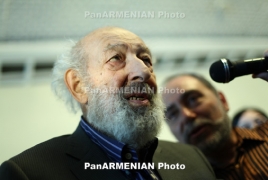Orhan Pamuk remembers his friend Ara Guler: New York Times November 2, 2018 - 12:23 AMT PanARMENIAN.Net - In a new article published on The New York Times, Orhan Pamuk, who won the Nobel Prize in Literature in 2006, remembers his friend Ara Guler, the great Turkish photographer of Armenian descent, who lovingly captured Istanbul and its people. Guler, who died on Oct. 17, was the greatest photographer of modern Istanbul. He was born in 1928 in an Armenian family in Istanbul. Ara began taking photographs of the city in 1950, images that captured the lives of individuals alongside the city’s monumental Ottoman architecture, its majestic mosques and magnificent fountains. "My friendship with Ara began in 2003, when I was consulting his archive of 900,000 photographs to research my book “Istanbul.” "In the early days of our friendship, we never spoke about Ara’s Armenian heritage and the suppressed, painful history of the destruction of the Ottoman Armenians — a subject that remains a veritable taboo in Turkey. I sensed that it would be difficult to speak about this harrowing subject with him, that it would put a strain on our relationship. He knew that speaking about it would make it harder for him to survive in Turkey," Pamuk says in the article. 1.5 million Armenians dies in the Genocide perpetrated by the Ottoman Empire in 1915-1923. Some three dozen countries have so far recognizes the Genocide. Turkey denies to this day. "Over the years, he trusted me a little and occasionally brought up political subjects he wouldn’t raise with others. One day he told me that in 1942, to avoid the exorbitant “Wealth Tax” the Turkish government was imposing specifically on its non-Muslim citizens, and to evade deportation to a forced labor camp on failing to pay the tax, his pharmacist father had left his home in Galatasaray and hidden for months in a different house, never once venturing outside. "He spoke to me about the night of Sept. 6, 1955, when in a moment of political tension between Turkey and Greece caused by events in Cyprus, gangs mobilized by the Turkish government roamed the city looting shops owned by Greeks, Armenians and Jews, desecrated churches and synagogues, and turned Istiklal Street, the central avenue that runs through Beyoglu, past Ara’s home, into a war zone. "Armenian and Greek families ran most of the stores on Istiklal Avenue. In the 1950s I would visit their shops with my mother. They spoke Turkish with an accent. When my mother and I would return home, I used to imitate their accented Turkish. After the ethnic cleansing of 1955, the purpose of which was to intimidate and exile the city’s non-Muslim minorities, most of them left Istiklal Avenue and their homes in Istanbul. By the mid-1960s, barely anyone was left. "Ara and I were comfortable talking in some detail about how he went about photographing these and other similar events. Yet we still did not touch upon the destruction of the Ottoman Armenians, Ara’s grandfathers and grandmothers." Six total incidents have burned 19 old-growth trees. Friday night 8 trees were torched along the beautiful main entrance. The EU does not intend to conduct military exercises with Armenia, Lead Spokesperson for EU Foreign Affairs and Security Policy Peter Stano says. Hikmet Hajiyev has said that there is no place for USAID operation in Azerbaijan any longer. A telephone conversation between Putin and Pashinyan before the CSTO summit is not planned, Peskov says. Partner news |